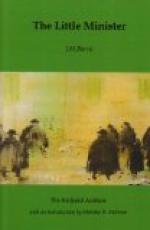“Look, mother, at that white house with the green roof. That is the manse.”
The manse stands high, with a sharp eye on all the town. Every back window in the Tenements has a glint of it, and so the back of the Tenements is always better behaved than the front. It was in the front that Jamie Don, a pitiful bachelor all his life because he thought the women proposed, kept his ferrets, and here, too, Beattie hanged himself, going straight to the clothes-posts for another rope when the first one broke, such was his determination. In the front Sanders Gilruth openly boasted (on Don’s potato-pit) that by having a seat in two churches he could lie in bed on Sabbath and get the credit of being at one or other. (Gavin made short work of him.) To the right-minded the Auld Licht manse was as a family Bible, ever lying open before them, but Beattie spoke for more than him-self when he said, “Dagone that manse! I never gie a swear but there it is glowering at me.”
The manse looks down on the town from the northeast, and is reached from the road that leaves Thrums behind it in another moment by a wide, straight path, so rough that to carry a fraught of water to the manse without spilling was to be superlatively good at one thing. Packages in a cart it set leaping like trout in a fishing-creel. Opposite the opening of the garden wall in the manse, where for many years there had been an intention of putting up a gate, were two big stones a yard apart, standing ready for the winter, when the path was often a rush of yellow water, and this the only bridge to the glebe dyke, down which the minister walked to church.
When Margaret entered the manse on Gavin’s arm, it was a whitewashed house of five rooms, with a garret in which the minister could sleep if he had guests, as during the Fast week. It stood with its garden within high walls, and the roof awing southward was carpeted with moss that shone in the sun in a dozen shades of green and yellow. Three firs guarded the house from west winds, but blasts from the north often tore down the steep fields and skirled through the manse, banging all its doors at once. A beech, growing on the east side, leant over the roof as if to gossip with the well in the courtyard. The garden was to the south, and was over full of gooseberry and currant bushes. It contained a summer seat, where strange things were soon to happen.
Margaret would not even take off her bonnet until she had seen through the manse and opened all the presses. The parlour and kitchen were downstairs, and of the three rooms above, the study was so small that Gavin’s predecessor could touch each of its walls without shifting his position. Every room save Margaret’s had long-lidded beds, which close as if with shutters, but hers was coff-fronted, or comparatively open, with carving on the wood like the ornamentation of coffins. Where there were children in a house they liked to slope the boards of the closed-in bed against the dresser, and play at sliding down mountains on them.




